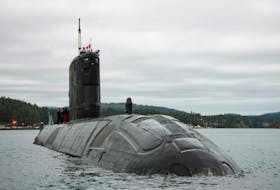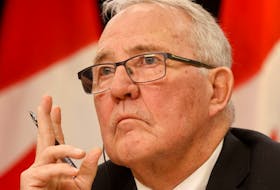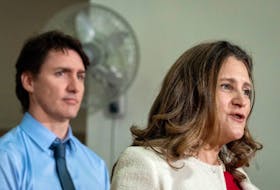When the Conservative leadership last fell vacant in 2015, Peter MacKay had only been out of federal politics for five months. He was building a private sector career with law firm Baker McKenzie, had two young children and his mother was fighting cancer. He considered taking a run but ultimately decided to pass.
Four years on, things are different. His mother Eirene passed away in 2017 and he’s since had a third child. But friends say he’s “100 per cent in” this time, that his path to victory is clearer and that he is merely arranging a leave of absence with his employer before going public.
MacKay’s wife, Nazanin Afshin-Jam, a formidable figure in her own right as a singer, model and human rights activist, is said to be supportive and he has built a leadership team that includes former MP Alex Nuttall, widely recognized as a good organizer.
As the National Post reported Tuesday, former Quebec premier Jean Charest is also poised to run – although he may yet be swayed by the response to a Globe and Mail report that he has been advising Chinese telecom giant Huawei on the Meng Wanzhou case and on 5G networks.
The conventional wisdom was that if Charest ran, MacKay would not challenge his former political mentor, the man who was leader of the Progressive Conservatives when he was first elected in 1997. Such was their relationship that when he was asked if he was interested in the PC leadership in 2001, MacKay said: “If there’s one thing I’ve learned in politics, it’s ‘never say never’. Jean Charest taught me that.”
But it appears, not for the first time, that the conventional wisdom is an ass. Both men seem intent on seeking the top job.
MacKay is said to believe that Charest might be able to win an election against the Liberals but is unlikely to have enough support in the Conservative Party to win the leadership – a point reinforced by the negative reaction on social media from Conservative partisans to the news he is likely to run.
At the same time, MacKay believes another front-runner, Pierre Poilievre, has enough support in the party to win the leadership but could not win the country – a view held by other candidates like Erin O’Toole, whose team has claimed Poilievre is unpopular with suburban women.
MacKay, a former defence, foreign affairs and justice minister, believes he is the only potential candidate who can appeal to the party rank-and-file and the broader electorate. This will irk O’Toole, who is positioning himself as the candidate with real world experience who can win in the suburbs around Toronto.
It looks as if the field is about to become crowded with progressive conservative corporate lawyers from eastern Canada, which may work to Poilievre’s advantage if the party base is looking for a different type of candidate, particularly if, as seems likely, Rona Ambrose decides to pass.
There may be other contenders. Businessman Bryan Brulotte is the only publicly declared candidate at this stage and he is an impressive individual – a fluently bilingual former military officer, who started a job placement company that now employs 3,000 people. He’s already pulled together a 20-page policy platform that has some interesting ideas like a negative income tax to help people who lose their jobs.
But the high bar imposed by the leadership organizing committee – a $300,000 entry fee and support from 3,000 party members in seven provinces – is likely to prove insurmountable to all but the most highly organized, high profile candidates.
Many Conservatives appear to consider Charest’s story to be too much (ambition), too little (conservatism), too late (he’s been out of federal politics for 22 years). One respected senior Conservative, who first met Charest as an aspiring 27-year-old leadership candidate in the mid-1980s, is typical in his belief that the former premier is a formidable campaigner, who is obsessively ambitious and not conservative. “He could win and he’d be better than Trudeau. Beyond that, I reserve judgment,” he said.
Yet, there remains a great deal of affection for MacKay. Despite the tensions between the Canadian Alliance and Progressive Conservative wings of the party after the merger he helped orchestrate, it is recognized that he was a strong team player during the Harper years, in some of the most senior positions in cabinet. Take just one example – he consented to relinquish the foreign affairs portfolio to take over at defence in 2007, after the incumbent minister Gordon O’Connor found himself in political hot water.
MacKay has told confidantes that there is window of opportunity for everyone. This could well be his.
[email protected]
Twitter.com/IvisonJ
Copyright Postmedia Network Inc., 2020








